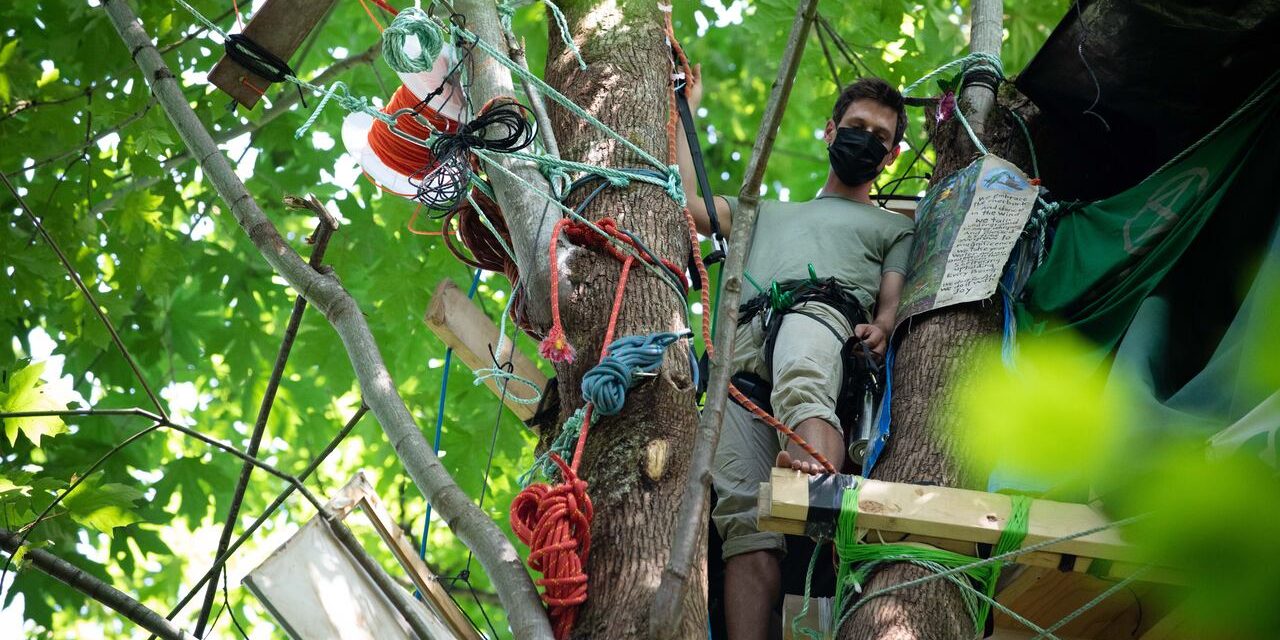
Above Photo: A masked protester occupies a tree house in the path of the Trans Mountain expansion in Burnaby. Protesters say they fear being removed from their year-long treetop sites after crews erected fences and cut trees in their vicinity. (Maggie MacPherson/CBC)
A Spokesperson For The Project Says The Fences Are Essential For Safety
Activists aiming to stop the Trans Mountain pipeline expansion in Burnaby say they fear being removed against their will after crews put up fencing and cut down trees in their vicinity on Tuesday and Wednesday.
For more than a year, protesters have been occupying treetops in the Brunette River Conservation Area, which sits on the path of the planned expansion to the existing 1,150-kilometre pipeline.
They say recent moves from Trans Mountain leave them worried their treetop vigil might be coming to an end.
“They’re sending a lot of workers on the ground to fence off these trees and to have them very isolated from our supporters that bring us food and bring in supplies every day,” said Timothée Govare, who has spent more than 100 days in the tree houses as part of the protest.
Govare says workers have also been cutting down trees a few metres from the protesters, and that he anticipates they will use heavy machinery in the coming days to “extract” them.
“I think they’re prepping for a siege. I think they will use their cherry-picker and get us out of here before we run out of food,” he said.
This comes on the heels of police enforcement at the Fairy Creek blockade in Vancouver Island, where protesters continue to experience what they describe as aggressive enforcement tactics, including the use of pepper spray.
A spokesperson for Trans Mountain said the fencing was put up to ensure safety of workers and communities.
“To accommodate construction and the safe operation of the new pipeline, forestry crews are required to clear land and remove trees located along the pipeline right-of-way and temporary workspace,” said the spokesperson.
“Trans Mountain respects the right to peaceful, lawful expressions of opinions. There is a B.C. Supreme Court injunction in place that prevents the blocking or obstructing of access to Trans Mountain’s work sites and work areas throughout British Columbia.”
Construction Delays And Activist Resistance
The Trans Mountain pipeline expansion aims to substantially increase the amount of crude and refined oil flowing from Alberta to B.C.’s coast, from the current 300,000 barrels to 890,000 barrels per day.
It has faced numerous setbacks that have delayed construction and significant resistance from Indigenous groups and environmental activists.
The Canadian government purchased the pipeline from oil giant Kinder Morgan in 2018 for $4.5 billion. In February 2020, it was revealed that the project’s total cost had soared to $12.6 billion
A recent report from West Coast Environmental Law projected that the expansion would be delayed into 2023, past its expected completion in December 2022.
“With so many construction delays over the past year, the cost of the pipeline has almost certainly increased,” the report reads.
According to the report, the cost may exceed $20 billion with the delays. It called for the next federal government to provide a transparent cost analysis of the project.
“It’s so important that we take action as citizens because our politicians are saying that they’re doing actions about the climate crisis. Yet they are not,” said Govare.
“This is criminal negligence because we know that climate change is killing people.”
Related posts:
Views: 0
 RSS Feed
RSS Feed

















 September 20th, 2021
September 20th, 2021  Awake Goy
Awake Goy 




 Posted in
Posted in  Tags:
Tags: 
















